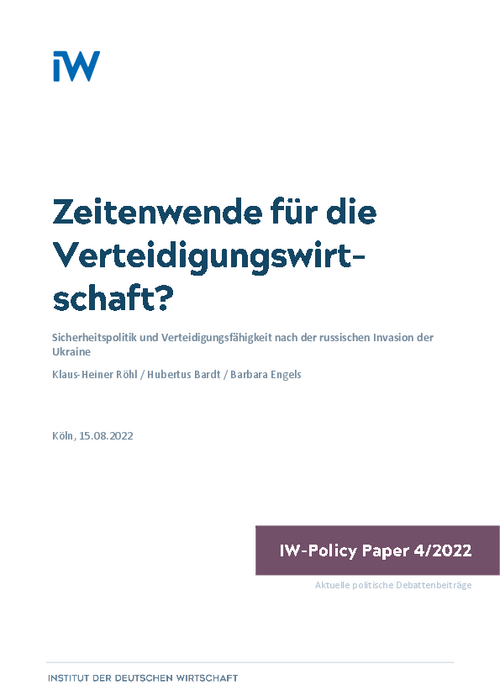The Russian attack on Ukraine has brought the question of the German Armed Forces’ operational capability back into focus. National defence, which seemed to play only a minor role with the end of the Cold War and the dissolution of the Warsaw Pact and the Soviet Union in 1991, now has gained a high political priority again.

A new era for the Defense Economy?: Security Policy and Defense Capability after the Russian Invasion of Ukraine

The Russian attack on Ukraine has brought the question of the German Armed Forces’ operational capability back into focus. National defence, which seemed to play only a minor role with the end of the Cold War and the dissolution of the Warsaw Pact and the Soviet Union in 1991, now has gained a high political priority again.
In his government declaration of 27 February 2022, German Chancellor Olaf Scholz spoke of a turning point in time due to this war and announced a special fund of 100 billion euros to strengthen the country’s defence capabilities. However, these extensive funds can only have a sustainable effect on security policy if the possibilities of the defence industry to supply new weapons systems and the possibilities of the Bundeswehr to use and maintain these weapons are brought into line. In 2020, the approximately 55,500 employees in the defence industrial sector in Germany produced weapons, combat aircraft, warships and military vehicles for approximately 11.3 billion euros; both figures were lower than in 2015 despite Russia's occupation of Crimea.
This policy paper therefore presents the status of plans to strengthen the Bundeswehr and classifies them in terms of security policy. In addition, the German defence industry with its sectors of aircraft and spacecraft, naval shipbuilding, combat vehicles as well as weapons and ammunition is portrayed and the increasingly important area of cyber defence is dealt with. The policy paper concludes with defence policy and defence industry recommendations derived from the previous chapters. Recommendations include a long-term plan for strengthening the Bundeswehr and the German defence industry, stronger cooperation with European partner countries on defence projects to reduce dependency on the U.S. and including the defence industry in the European taxonomy for the financial sector, as its current status of non-sustainability threatens especially smaller and medium defence companies that are important for European security.

A new era for the Defense Economy?: Security Policy and Defense Capability after the Russian Invasion of Ukraine

More on the topic

Pharmaceutical industry: Increasing pressure on the labor market
The shortage of skilled workers poses significant challenges for pharmaceutical companies in Germany and is expected to become increasingly problematic in the context of demographic changes. Concerning Germany's positioning in the international competition ...
IW
Industrial policy at the turn of the times
The current debate on industrial policy vacillates between the extreme positions of an orthodoxy of rejecting state action and a naive belief in the state's ability to control structural change.
IW